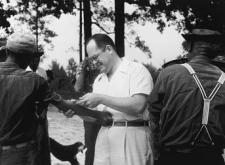Did Infamous Tuskegee Study Cause Lasting Mistrust of Doctors Among Blacks?
By Aaron E. Carroll,
The New York Times
| 06. 17. 2016
There is no question that the Tuskegee study is one of the most horrific examples of unethical research in recent history. For 40 years, ending in 1972, members of the United States Public Health Service followed African-American men infected with syphilis and didn’t treat them (although they told some men they did) so that they could see the disease take its course.
There’s also no question that this experiment shook the foundations of trust between Americans, especially black Americans, and the medical establishment. A new paper argues that this wound was so severe that it led older African-American men to avoid care, leading to a decrease in life expectancy of 1.4 years, accounting for about a third of the discrepancy in life expectancy between black and white men by 1980.
While few question that there are racial disparities in life expectancy or health care, and no one questions the utter lapse in ethics of the Tuskegee experiment, we should still be wary in connecting the two without a clear causal link. To do so compounds mistrust in the health care...
Related Articles
By Katherine Long, Ben Foldy, and Lingling Wei, The Wall Street Journal | 12.13.2025
Inside a closed Los Angeles courtroom, something wasn’t right.
Clerks working for family court Judge Amy Pellman were reviewing routine surrogacy petitions when they spotted an unusual pattern: the same name, again and again.
A Chinese billionaire was seeking parental...
By David Jensen, The California Stem Cell Report | 12.11.2025
California’s stem cell and gene therapy agency today approved spending $207 million more on training and education, sidestepping the possibility of using the cash to directly support revolutionary research that has been slashed and endangered by the Trump administration.
Directors...
By Sarah Kliff, The New York Times | 12.10.2025
Micah Nerio had known since his early 30s that he wanted to be a father, even if he did not have a partner. He spent a decade saving up to pursue surrogacy, an expensive process where he would create embryos...
Several recent Biopolitical Times posts (1, 2, 3, 4) have called attention to the alarmingly rapid commercialization of “designer baby” technologies: polygenic embryo screening (especially its use to purportedly screen for traits like intelligence), in vitro gametogenesis (lab-made eggs and sperm), and heritable genome editing (also termed embryo editing or reproductive gene editing). Those three, together with artificial wombs, have been dubbed the “Gattaca stack” by Brian Armstrong, CEO of the cryptocurrency company...




